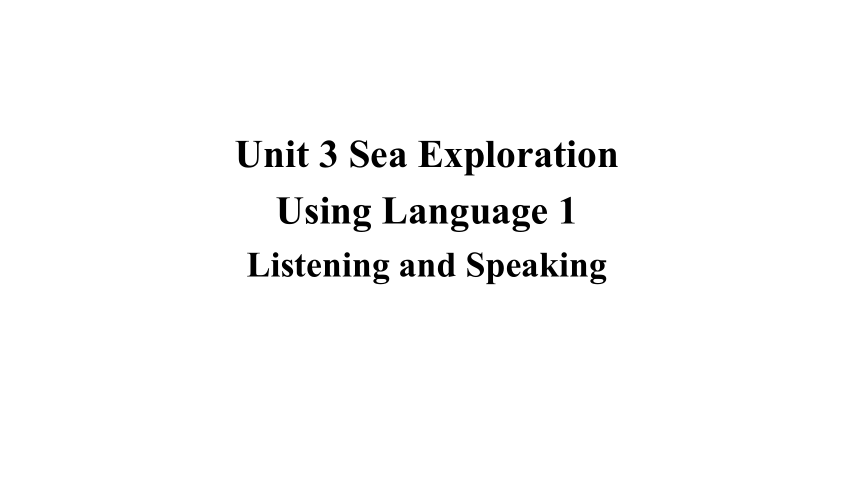(
课件网) Unit 3 Sea Exploration Using Language 1 Listening and Speaking In this class, you will 1. Read the poster and discuss the questions; 2. Collect information about the Whale Watching Camp through listening; 3. Retell the activities of the camp and express your own ideas and feelings; 4. Watch the video and make a plan for the trip to see the animals. Learning objectives blue whale What is the biggest creature in the world Join a whale watching camp How can we observe whales at close range Q: What attracts you most in the poster Read and Discuss Listen to the head researcher talking to the campers at the end of day. What three things were the campers asked to do 1. _____ 2. _____ 3. _____ to find out some facts for a whale profile to think about why they do whale research to go out with and write a report of the work they do While-listening 1st Listening After that, we gave the group of whales a name, and each member a number. They will be added to the directory so we can identify them in the future. Most whales have slightly different fins and marks, which can help us to tell them apart. Meanwhile, we also noted their location, so we can track their movements and plot their migration path. Then we took pictures of their fins. Finally, we contacted other whale research groups around the world to share the information with them. First, we followed a group of whales with the boat. Later, we created a database of their fins and locations. 1 2 3 4 5 6 7 8 Listen to Luke’s part of the conversation again. Number the following sentences in the correct order. Then work out what they have done at the camp. 2nd Listening Listen to the conversation again and answer the questions. 1. How many species of whales are there 2. What is the criterion to divide the main types of whales 3. What do whales use sounds for 4. Why do the campers take pictures of the whales' fins 5. Why do they contact other research groups 3rd Listening 1. How many species of whales are there Over 80. 2. What is the criterion to divide the main types of whales The criterion is whether they have teeth or not. 3. What do whales use sounds for They use sounds to communicate and hunt. 4. Why do the campers take pictures of the whales' fins This can help them to tell the whales apart. 5. Why do they contact other research groups They want to share information with them. 3rd Listening Some of the students could not make it to the camp. Imagine you were there. Tell your partner about what happened, using the expressions in the box below. Your partner can also ask questions to find out more about what happened. Expressing sequence First(ly),… Second(ly), ... Third(ly), ... First of all... Then/After that/Afterwards/Next/Later on… In the end/At last, ... At that time.. It began when... Meanwhile… Later… Finally… Q1: Which activity impressed you most And why Q2: Is it important to carry out research on whales and other sea creatur ... ...

